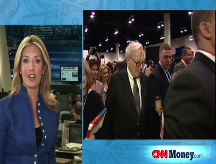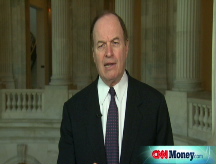Bailout cost unknown - CBO
Budget agency can't give an estimate. But given the assets the Treasury would buy, they would return value.
NEW YORK (CNNMoney.com) -- Average Americans aren't the only ones who think they don't have enough information to assess the Treasury's proposal to buy up to $700 billion of troubled mortgage assets.
Even one of the country's top bean counters can't say with certainty how much the plan will ultimately cost taxpayers, if anything.
The Congressional Budget Office says that it is "impossible" to estimate the bottom line cost of the Treasury's bailout proposal given its lack of specificity.
However, in testimony before the House Budget Committee on Wednesday, CBO Director Peter Orszag said that the CBO expects the net cost to be "substantially less" than the $700 billion requested by the Bush administration.
"It seems implausible that the U.S. would lose every cent on the dollar for the purchases it made," Orszag said.
That's because under the proposed program, which is being debated feverishly in Congress, Uncle Sam would buy assets that have underlying value.
If it overpays, the government could be left with a net loss. If he pays fair market value - which investors have had a hard time determining - taxpayers stand a chance to break even or make a profit if those assets throw off income or appreciate in value by the time the government sells them.
Lawmakers on the committee expressed concern over whether the the program would drive up the cost of federal government borrowing - a particularly important issue since the federal budget deficit this year is expected to reach$407 billion and climb higher next year.
The government borrows a lot of the money the country spends. And if buyers of U.S. debt become concerned Uncle Sam may be under strain to repay them, they may demand a higher interest rate when they buy Treasurys.
Orszag said rates could go up if the market suspects or is uncertain about whether the Treasury overpaid for assets in the bailout.
When asked what the ramifications might be if lawmakers reduced or increased the amount of money the Treasury could invest in this venture, Orszag said, "it's in no small part a confidence game." That is, the market has been led to believe the country will put $700 billion into this effort, so it can be risky to change those expectations at the last minute.
And what if lawmakers don't pass a bailout plan?
"Being able to obtain credit is crucial for households and firms," Orszag said. If sources for liquidity dry up - and, he said, there are already "ominous signs pf credit difficulties are accumulating" - "we'll have severe turmoil in the real economy."
For those who wonder how this turmoil can affect them, Orszag said, "It will come home in the form of your company being unable to fund its operations and the rates you'll pay for a mortgage and car loan. Those kinds of effects come sometime after the financial market turmoil begins, but they do come."
For the economy as a whole, "you'd have a financial meltdown and it would cause very serious economic dislocation on the order of Great Depression effects," he said.
Put simply, Orszag said, "it would be a very bad situation." ![]()




